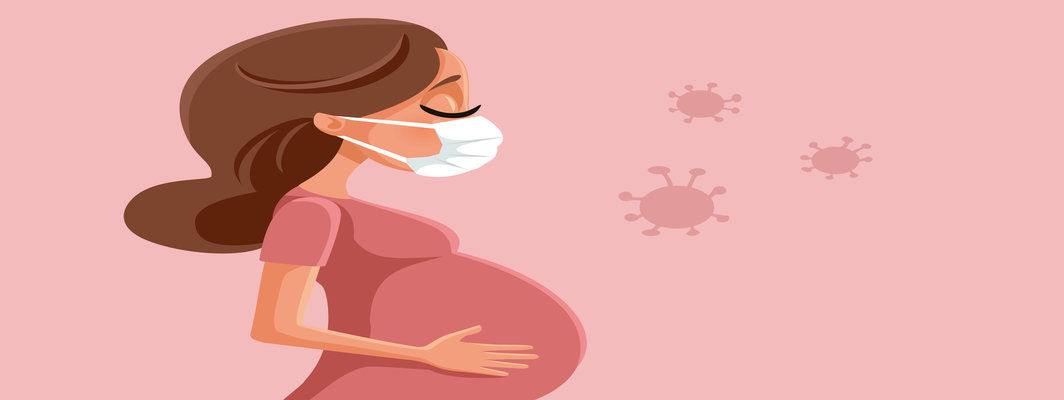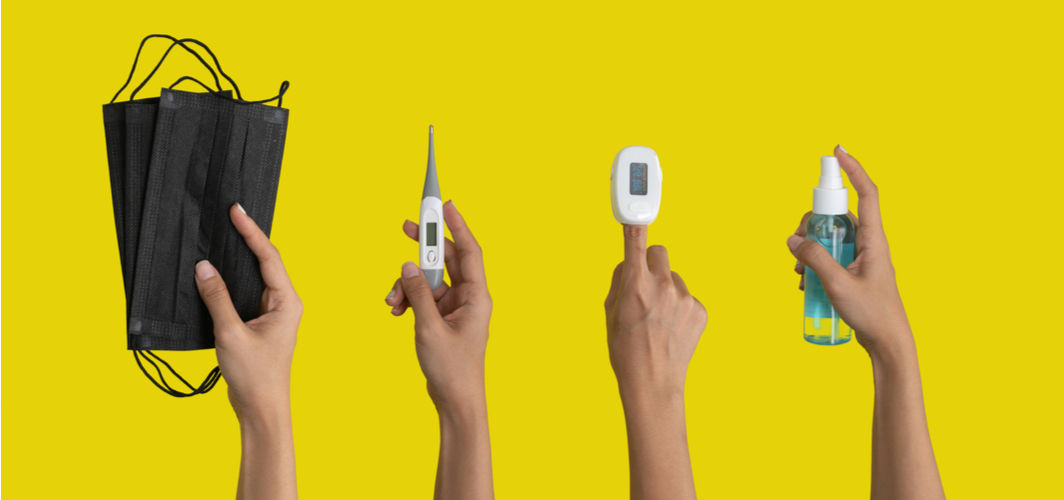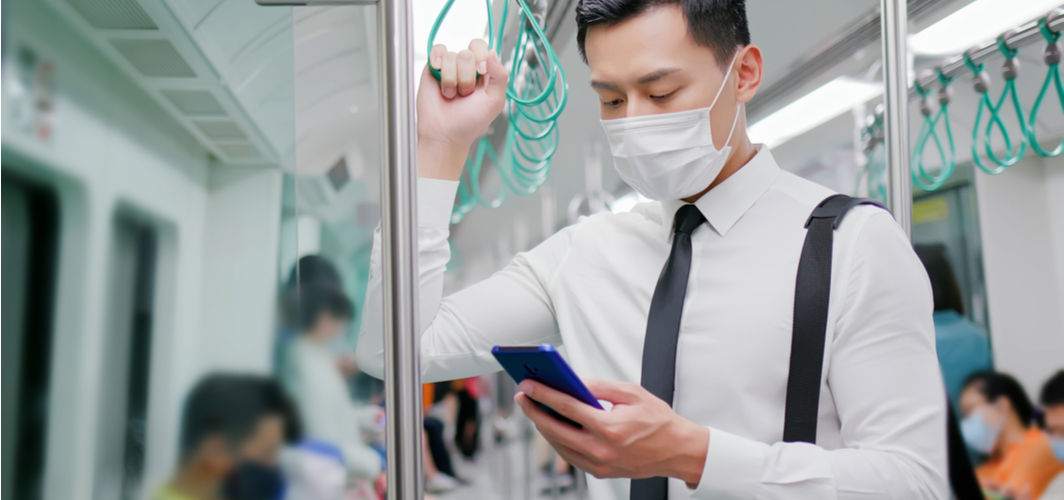Coronavirus Updates
How Can Pregnant Women Protect Themselves and Their Babies Against Coronavirus?
6 min read
By Apollo 24/7, Published on - 16 June 2020, Updated on - 18 October 2022
Share this article
3
12 likes

Pregnancy is a special time full of cheerful optimism, anticipation, and joy. It is natural though, that some pregnant women may be concerned about the novel Coronavirus and COVID-19, the disease it causes. Given that this is a novel virus, not much is known about its impact on pregnant women. Early data regarding pregnancy outcomes in COVID-19 is reassuring, showing that there is no evidence of a higher risk for severe illness. Consequently, pregnant women should continue to stay positive, while taking the necessary precautions.
Equally, pregnant women are vulnerable to respiratory infections owing to the change in their immune, respiratory, and cardiovascular physiology that occurs during pregnancy. Hence, they need to take the right steps for protection against COVID-19.
What effect can Coronavirus have on the mother?
Researchers are still trying to learn more about how Coronavirus impacts pregnant women. Here’s what most studies say at the moment:
- A study of 118 pregnant women in Wuhan, China, with confirmed Coronavirus showed that 92% of women had mild disease while only 8% had severe disease. There were no deaths reported in this study published in the New England Journal of Medicine (NEJM). Further study also found no evidence of Coronavirus in neonates, breast milk, and cord blood.
- Another study published in NEJM looked at pregnant women from two hospitals in New York City from March to April 2020. The study included 215 pregnant women out of which33 women tested positive for COVID-19 while29 women (87.9%) were found to be asymptomatic.
Although the studies were small, the above data shows that COVID-19 risk among pregnant women is similar to any other person in the community, and chances of severe illness are also low. Another important finding from the studies is that most pregnant women infected with Coronavirus are asymptomatic. Hence, researchers are further studying the benefit of universal testing approach.
What effect can Coronavirus have on the baby?
This is a new virus and more is being learned about it every day. Emerging evidence from various studies published in the Lancet journal suggests that vertical transmission of Coronavirus is not possible. Vertical transmission is the spread of the virus from mother to baby during pregnancy or birth. Although few studies showed indirect proof for vertical transmission by testing the presence of antibodies in neonates, we need further studies with large data to conclude. As per the World Health Organization (WHO), there was no active virus found in samples of amniotic fluid or breast milk.
Newborns may get infected with Coronavirus after being in close contact with an infected person. Few babies were tested positive immediately after birth but it is unknown if these babies got the virus before, during, or after birth. Most newborns who got infected had mild or no symptoms. Few case reports of preterm birth are seen among babies of COVID-19 positive mothers but it is unclear if it is because of Coronavirus.
What can pregnant women do to protect themselves from Coronavirus?
The Centers for Disease Control and Prevention (CDC) has listed a few precautions to be taken by pregnant women to lower their risk of contracting the virus. They are as follows:
- Practice social distancing by at least 6 feet while in crowded places. Avoid meeting unwell people
- Practice frequent hand washing with soap and water for at least 20 seconds. Use hand sanitizer if soap and water are not readily available
- Avoid touching mouth, nose, and eyes before washing hands
- Follow respiratory etiquettes like using paper tissue while sneezing and coughing. Advise your family members also to do the same. Discard tissue in a closed bin and wash hands immediately
- Clean and disinfect all frequently touched surfaces at home. Launder clothes and toys regularly in warm water; dry them out completely
- Pregnant mother and newborn after delivery, both must continue to receive recommended vaccines by a health care professional
- Do not delay emergency care due to the fear of COVID-19. Continue the doctor consultation during pregnancy and post-delivery. Try to use telemedicine services if feasible, which are appointments over audio or video calls
- Delivering under the supervision of a doctor is always safe. Hence, avoid delivering at home due to COVID-19 fear
- Some might think that an infected mother must avoid normal delivery. But the WHO advises that cesarean section should only be performed for medical reasons but not for COVID-19 disease
- Some women may experience depression during and post-delivery and the current COVID-19 situation can add up to the anxiety. It is advisable to consult a doctor and it can be treated.
Recommended Read: How Can Pregnant Women Protect Themselves and Their Babies Against Coronavirus?
What are the precautions to be taken post-delivery?
Mothers who do not have COVID-19 are also advised to follow a few precautions for general safety after delivery to lessen the risk of any infections.
- Follow hand hygiene and social distancing of at least 6 feet
- Minimize the exposure time of mother and baby to other people and avoid meeting unwell people
- Family members and visitors must wash hands and wear masks before interacting with the newborn
- Postnatal doctor checkups for mother and baby are advisable to be continued along with precautions to lessen the risk of contraction of Coronavirus.
Care for babies born to mothers with suspected or confirmed COVID-19
Based on the current data, temporary separation of the newborn from the mother may be considered to reduce the risk of spreading Coronavirus to the newborn. The risk and benefits of temporary separation are generally discussed with the mother by the doctor.
If a mother chooses temporary separation:
- She must express breast milk and a healthy caregiver may feed the newborn baby
- She must do frequent pumping (every 2 to 3 hours, at least 8 to 10 times in 24 hours) to signal further milk production and prevent blocked milk ducts and breast infections
- Use a dedicated breast pump
- Wear a mask and wash hands before touching the pump or any bottle parts and before expressing milk
- Proper pump cleaning must be done by the caregiver, if available.
If a mother rejects temporary separation and chooses to breastfeed, she should:
- Follow frequent hand washing. Wear a face-covering cloth mask while breastfeeding and when within 6 feet of the newborn
- Use physical barriers such as placing the newborn in a crib
- Minimize her interaction with the newborn until she recovers. If a caregiver is available, they should take care of the newborn at all times.
The CDC also suggests that newborns and infants should not use plastic face shields or face covering cloth masks due to the risk of suffocation.
Conclusion
The COVID-19 risk among pregnant women is similar to that of any other person in the community. Moreover, most infected women had a mild disease or no symptoms. However, in general, pregnant women are vulnerable to all respiratory infections. Hence, it is advisable to follow the necessary social distancing and other precautions.
The likelihood of an infected mother transmitting the virus to the child during pregnancy is low but it might happen after the delivery due to close contact. However, considering the advantages of breast milk and no evidence of Coronavirus in breast milk in studies, a mother can continue feeding her baby, with precautions.
Coronavirus Updates
Leave Comment
Recommended for you

Coronavirus Updates
What Should a ‘Coronavirus Home Kit’ Include?
Due to rising number of COVID-19 cases, home isolation is recommended for people who are asymptomatic or has mild symptoms. A Coronavirus home kit is advisable in such times.

Coronavirus Updates
D-dimer and Interleukin-6 Tests to Understand COVID-19 Progression
These tests can help indicate the risk and determine the disease progression of COVID-19 as some people develop severe consequences without exhibiting any symptoms.

Coronavirus Updates
Safety and Hygiene Tips to Follow When Using Public Transport After the COVID-19 Lockdown
Take all the necessary precautions given in this article, including wearing masks and practicing social distancing, to protect ourselves when using public transport after lockdown.
Subscribe
Sign up for our free Health Library Daily Newsletter
Get doctor-approved health tips, news, and more.
Visual Stories

COVID-19 Home Care: Guidelines for Patients and Caregivers
Tap to continue exploring
Recommended for you

Coronavirus Updates
What Should a ‘Coronavirus Home Kit’ Include?
Due to rising number of COVID-19 cases, home isolation is recommended for people who are asymptomatic or has mild symptoms. A Coronavirus home kit is advisable in such times.

Coronavirus Updates
D-dimer and Interleukin-6 Tests to Understand COVID-19 Progression
These tests can help indicate the risk and determine the disease progression of COVID-19 as some people develop severe consequences without exhibiting any symptoms.

Coronavirus Updates
Safety and Hygiene Tips to Follow When Using Public Transport After the COVID-19 Lockdown
Take all the necessary precautions given in this article, including wearing masks and practicing social distancing, to protect ourselves when using public transport after lockdown.